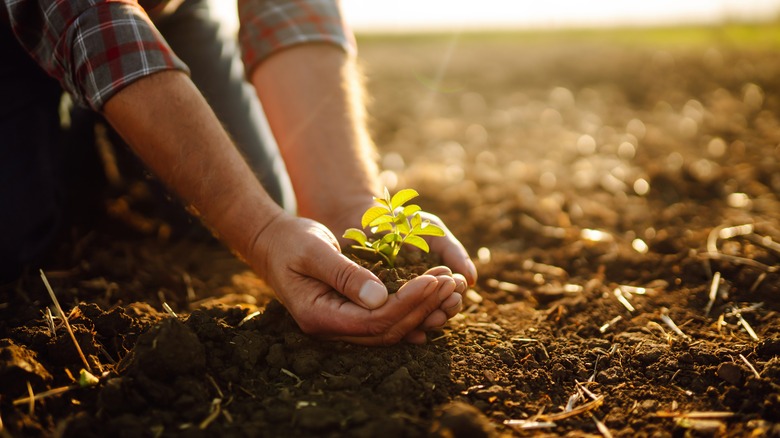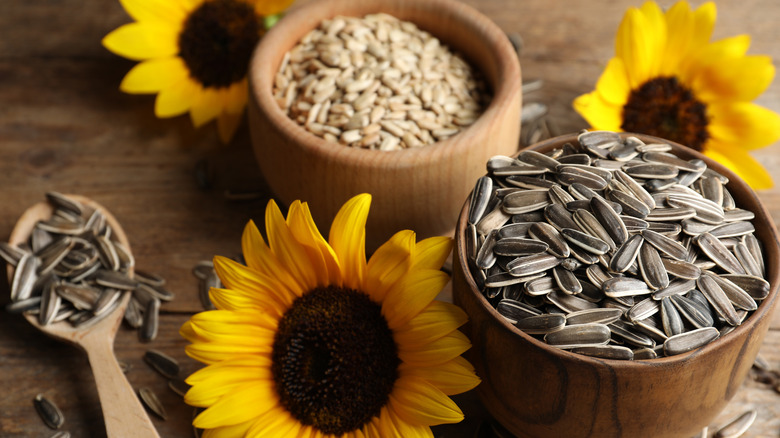Can Seeds Actually Germinate In Your Stomach?
Life on Earth would be different, perhaps completely nonexistent, without seeds, those tiny incubation chambers for plant embryos, keeping the fruits and veggies we eat — not to mention all sorts of other flora types — safe and sound in their early stages of growth. Thought to have evolved some 360 million years ago (via EarthSky), it could, in fact, be said that seeds are among nature's greatest inventions. Vegetarian and omnivorous animals, just like us, come along to munch down on delicious seed-bearing vegetation, only to wander off and pass those seeds through our systems, back into the Earth, where the seed germinates and the plant grows, only to be eaten, which starts the process all over again.
As anyone who has ever seen a dandelion sprout from a crack in the pavement can attest, hearty seeds often sprout in the unlikeliest places. Since many living things have seeds in their diet, what keeps a seed from germinating in our stomachs, or in the stomachs of a number of other living things that regularly consume them? A 2,000-year-old date palm seed in Israel was successfully germinated in 2008, according to The New York Times. Why, then, don't more seeds germinate in our bodies and in our stomachs? To answer that question requires a thorough understanding of how seeds work, the digestive process of an animal, and what the inside of a living creature's stomach is actually like.
How do seeds work?
Something like a human embryo in the uterus, each seed works somewhat differently, but most seeds share core similarities across all plant species. As well as offering protection from the elements, within the seed structure are all the nutrients a plant needs to grow and establish a root system all on its own. As water gradually soaks through the so-called seed coating — and so long as conditions are favorable in other ways for the plant species in question to flourish — the process of germination begins and the seed sprouts.
It's not just enough water that a seed needs to sprout, either. Adequate amounts of oxygen, warmth (or lack thereof), and even sunlight for certain types of plants all play a part in the process. All things being equal, once a seed finds its conditions to be hospitable, cell reproduction accelerates and the plant grows to reach maturity, producing seeds of its own. With that, the cycle of plant reproduction begins again, as the Backyard Gardener from the University of Arizona explains.
How do our stomachs work?
Now that some sense of how seeds work is established, the next step in answering whether or not a seed could germinate in our stomach is to examine the role that stomachs play in our digestive process. There are many steps in the consumption and digestion of food, but once the food that we eat reaches this crucial organ, it's greeted by a number of different enzymes, acids, and juices which break down what we've eaten, with muscle contractions churning the food periodically to make sure all the good bits are extracted. Once that process is complete, whatever's left over gets passed through a sphincter in the stomach to the small intestine, where the next stage, or passing the unusable parts of the food and the liquid we eat and drink from the body, begins, as Cleveland Clinic notes.
As anyone who's eaten something that doesn't agree with their stomach, or who has had a touch of indigestion or heartburn, knows all too well, the process of digesting food when it goes wron, can cause a good deal of pain and discomfort — with seeds or otherwise. We put all sorts of things in our bodies. Breaking down core nutrients for growth and to maintain life is important. For that reason, our stomachs are tough, and most often, more than up for the challenge.
Can seeds sprout in our stomachs?
Nutrient-rich seeds are an important part of our diet, according to Healthline. What's more, it's a symbiotic relationship: Crow munches delicious, seed-encrusted berry, flies away, passes the seed from its system, and the plant grows anew — what a win-win! That cycle would be broken, of course, if the strawberry seed in the bird sprouted inside the bird. For this reason, the environment inside a living thing's stomach — including those of human beings — is just too inhospitable and full of acid for seeds to be able to sprout. The seed coating is also tough enough to withstand the assault from stomach juices and so can pass through our system. Nor have urban legends about a seed sprouting from inside a dead body proven to be true, as Live Science reports.
So, no, despite what we were all warned as children about ingesting seeds and the ensuing green vines that might sprout from our mouth, it just can't happen. The conditions — including neither sunlight nor soil nor adequate water, not to mention those acidic stomach juices — just aren't right. Should a seed find its way into another part of our body, though, such as the lung, it is possible for that seed to sprout, based on a 2010 report from the BBC. This proves that while eating seeds is perfectly safe, even beneficial, we really should chew our food slowly. Don't inhale it — literally or figuratively.



